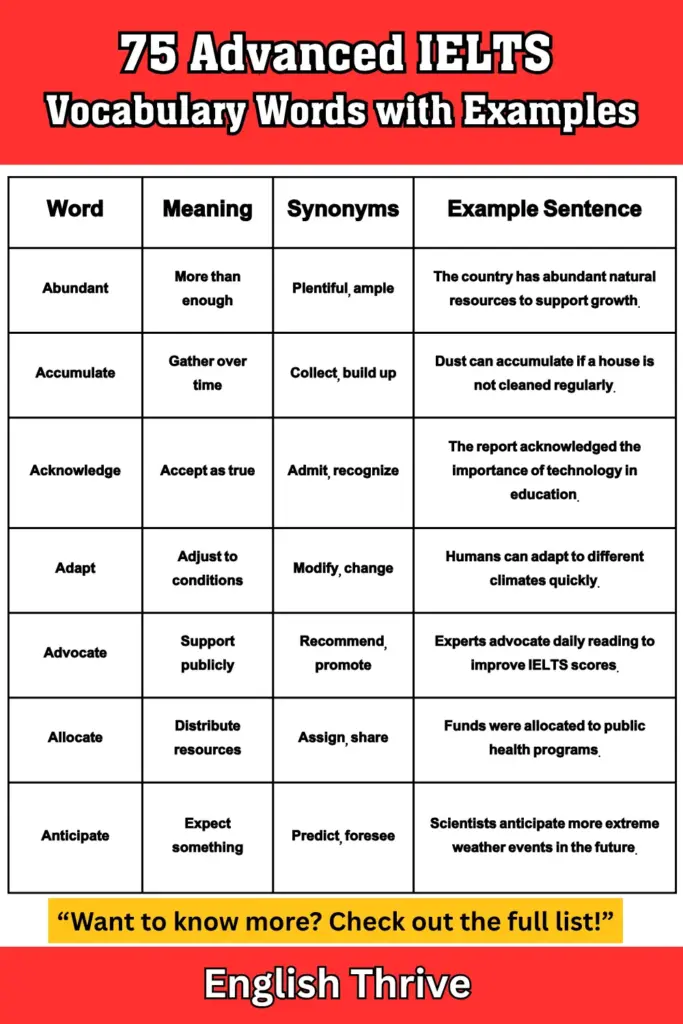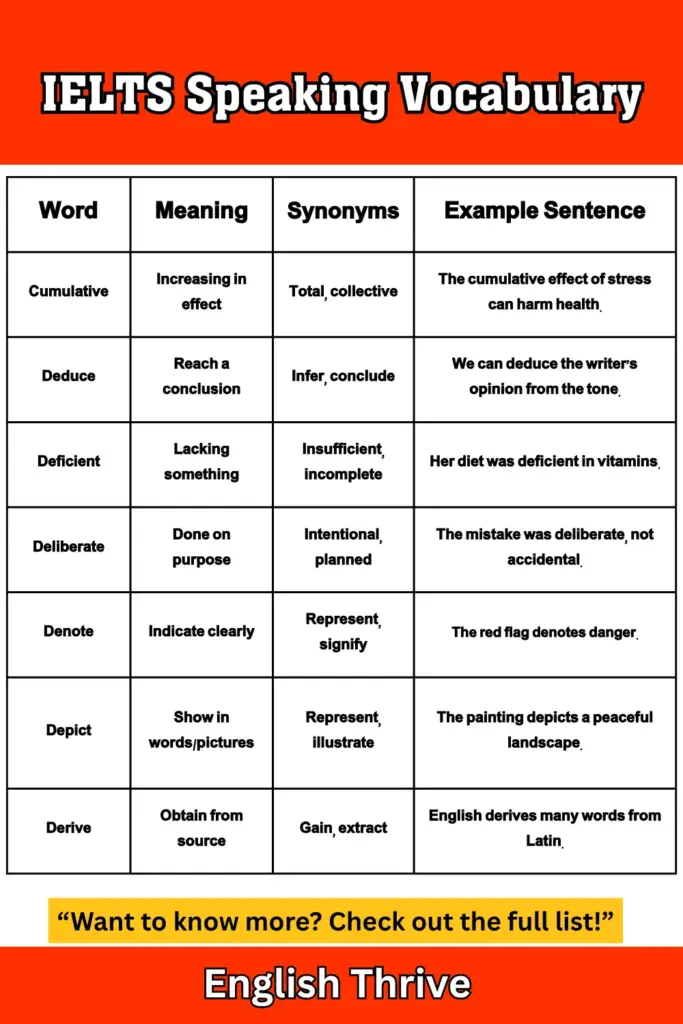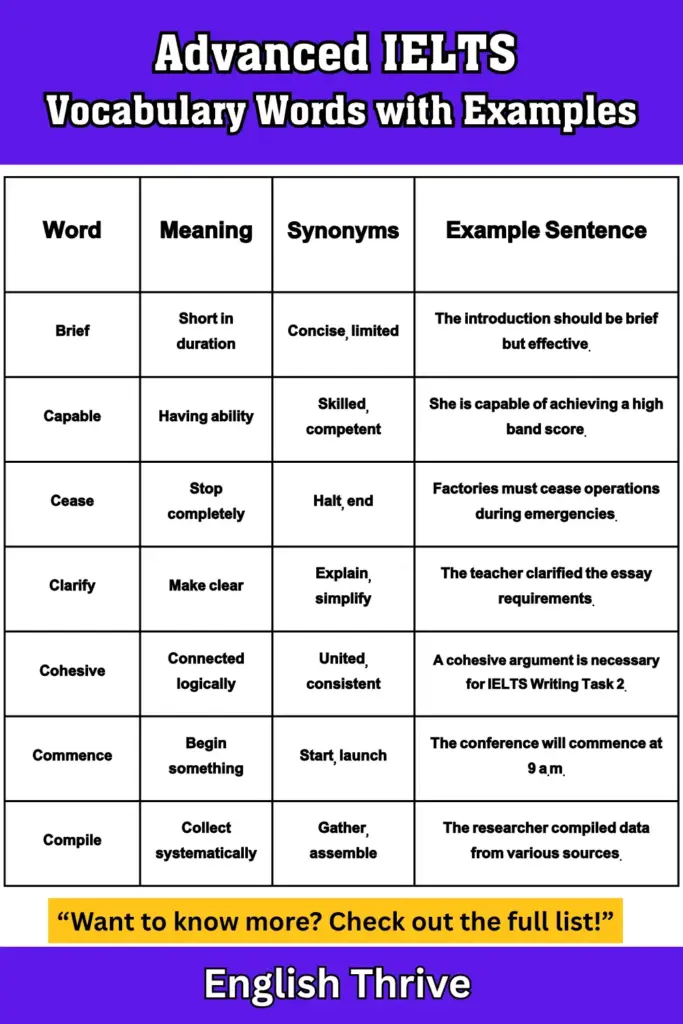Aiming for a band 7 or higher on the IELTS? Vocabulary plays a key role in the band descriptors that examiners use to assess your writing and speaking.
If you rely on simple words like good or bad, your score could suffer. What you really need is variety — accurate, academic words that show range and precision.
That’s why I’ve put together this list of 75 advanced IELTS vocabulary words with examples that will help you improve your vocabulary, boost your confidence, and impress examiners in both writing and speaking.
Contents
Toggle75 Advanced IELTS Vocabulary Words with Examples
Group 1: Academic IELTS Vocabulary
| Word | Meaning | Synonyms | Example Sentence |
|---|---|---|---|
| Abundant | More than enough | Plentiful, ample | The country has abundant natural resources to support growth. |
| Accumulate | Gather over time | Collect, build up | Dust can accumulate if a house is not cleaned regularly. |
| Acknowledge | Accept as true | Admit, recognize | The report acknowledged the importance of technology in education. |
| Adapt | Adjust to conditions | Modify, change | Humans can adapt to different climates quickly. |
| Advocate | Support publicly | Recommend, promote | Experts advocate daily reading to improve IELTS scores. |
| Allocate | Distribute resources | Assign, share | Funds were allocated to public health programs. |
| Ambiguous | Unclear meaning | Vague, uncertain | The instructions were ambiguous and confused the students. |
| Anticipate | Expect something | Predict, foresee | Scientists anticipate more extreme weather events in the future. |
| Apparent | Clearly seen | Obvious, evident | It became apparent that the plan was unrealistic. |
| Appreciate | Value something | Admire, respect | Students appreciate teachers who give clear feedback. |
| Arduous | Very difficult | Tough, challenging | Preparing for IELTS can be an arduous process. |
| Assess | Evaluate something | Judge, examine | The examiner assessed the candidate’s fluency carefully. |
| Assume | Suppose something | Presume, guess | We can’t assume success without hard work. |
| Beneficial | Helpful, useful | Advantageous, valuable | A balanced diet is beneficial for good health. |
| Bias | Prejudice for/against | Favoritism, partiality | The article showed bias towards one political party. |

Group 2: IELTS Writing Vocabulary
| Word | Meaning | Synonyms | Example Sentence |
|---|---|---|---|
| Brief | Short in duration | Concise, limited | The introduction should be brief but effective. |
| Capable | Having ability | Skilled, competent | She is capable of achieving a high band score. |
| Cease | Stop completely | Halt, end | Factories must cease operations during emergencies. |
| Clarify | Make clear | Explain, simplify | The teacher clarified the essay requirements. |
| Cohesive | Connected logically | United, consistent | A cohesive argument is necessary for IELTS Writing Task 2. |
| Commence | Begin something | Start, launch | The conference will commence at 9 a.m. |
| Compile | Collect systematically | Gather, assemble | The researcher compiled data from various sources. |
| Comprehensive | Covering all areas | Complete, thorough | The book offers a comprehensive guide to IELTS preparation. |
| Concur | Agree with | Coincide, consent | Experts concur that climate change is a major issue. |
| Confine | Keep within limits | Restrict, limit | The patient was confined to bed for a week. |
| Conspicuous | Easy to notice | Obvious, visible | Her bright red dress was conspicuous in the crowd. |
| Contribute | Give to a cause | Donate, provide | Citizens should contribute to community development. |
| Conventional | Traditional, usual | Standard, common | He prefers conventional teaching methods. |
| Convey | Communicate meaning | Express, deliver | The writer conveyed his ideas clearly. |
| Crucial | Extremely important | Vital, essential | Time management is crucial in the IELTS exam. |
Group 3: IELTS Speaking Vocabulary
| Word | Meaning | Synonyms | Example Sentence |
|---|---|---|---|
| Cumulative | Increasing in effect | Total, collective | The cumulative effect of stress can harm health. |
| Deduce | Reach a conclusion | Infer, conclude | We can deduce the writer’s opinion from the tone. |
| Deficient | Lacking something | Insufficient, incomplete | Her diet was deficient in vitamins. |
| Deliberate | Done on purpose | Intentional, planned | The mistake was deliberate, not accidental. |
| Denote | Indicate clearly | Represent, signify | The red flag denotes danger. |
| Depict | Show in words/pictures | Represent, illustrate | The painting depicts a peaceful landscape. |
| Derive | Obtain from source | Gain, extract | English derives many words from Latin. |
| Deteriorate | Become worse | Decline, worsen | Air quality has deteriorated in urban areas. |
| Devote | Give time to | Dedicate, commit | She devoted years to IELTS preparation. |
| Differentiate | Show differences | Distinguish, separate | It’s important to differentiate facts from opinions. |
| Diminish | Reduce in size | Decrease, lessen | The new policy may diminish pollution levels. |
| Disclose | Make known | Reveal, expose | The report disclosed the company’s financial problems. |
| Displace | Take the place of | Replace, shift | Technology may displace some traditional jobs. |
| Distort | Twist the truth | Misrepresent, falsify | The media distorted the facts of the event. |
| Diverse | Showing variety | Varied, different | The city has a diverse cultural population. |

Group 4: IELTS Task 1 Vocabulary
| Word | Meaning | Synonyms | Example Sentence |
|---|---|---|---|
| Elaborate | Add more detail | Explain, expand | She elaborated on her main points. |
| Emphasize | Highlight importance | Stress, underline | The graph emphasizes the rise in population. |
| Encounter | Come across | Face, meet | Students may encounter difficulties in reading tasks. |
| Endorse | Approve publicly | Support, back | The project was endorsed by the mayor. |
| Enhance | Make better | Improve, boost | Vocabulary enhances both writing and speaking skills. |
| Evaluate | Assess carefully | Judge, analyze | The teacher evaluated the essay thoroughly. |
| Evident | Clear, obvious | Apparent, visible | It is evident that education improves opportunities. |
| Exceed | Go beyond limit | Surpass, outdo | Sales exceeded expectations last year. |
| Exclude | Leave out | Omit, eliminate | The data excluded rural populations. |
| Exhibit | Show clearly | Display, demonstrate | The museum exhibits ancient artifacts. |
| Explicit | Stated clearly | Clear, definite | The rules were explicit and easy to follow. |
| Exploit | Use unfairly | Take advantage, misuse | Companies sometimes exploit cheap labor. |
| Facilitate | Make easier | Assist, enable | Good teaching facilitates learning. |
| Feasible | Possible to do | Practical, achievable | The plan is feasible within the budget. |
| Fluctuate | Change irregularly | Vary, oscillate | Prices fluctuate depending on demand. |
Group 5: IELTS Task 2 Vocabulary
| Word | Meaning | Synonyms | Example Sentence |
|---|---|---|---|
| Fundamental | Basic, essential | Primary, vital | Freedom of speech is a fundamental right. |
| Generate | Produce or create | Yield, make | The project generated new jobs. |
| Hypothesis | Assumed explanation | Theory, assumption | The scientist tested her hypothesis. |
| Identical | Exactly the same | Equal, alike | The twins wore identical clothes. |
| Illustrate | Explain with examples | Demonstrate, show | The essay illustrated his main argument. |
| Imply | Suggest indirectly | Indicate, hint | Her tone implied dissatisfaction. |
| Incentive | Motivation to act | Reward, encouragement | Bonuses provide incentives for employees. |
| Inhibit | Prevent or restrain | Hinder, restrict | Shyness can inhibit speaking performance. |
| Integrate | Combine into whole | Unite, merge | Immigrants integrate into new cultures over time. |
| Intense | Very strong | Extreme, powerful | He felt intense pressure before the exam. |
| Interpret | Explain meaning | Clarify, analyze | The teacher interpreted the poem in detail. |
| Intrinsic | Naturally part of | Inherent, essential | Honesty is intrinsic to good leadership. |
| Justify | Give valid reasons | Defend, explain | The student justified her opinion with evidence. |
| Legislate | Make laws | Enact, regulate | The government legislated new safety measures. |
| Maintain | Keep in good state | Preserve, continue | He maintained his fluency with daily practice. |
FAQs About IELTS Vocabulary
1. How many words should I learn daily?
Start with 5–10 words a day. Consistency is more important than quantity.
2. How can I remember these words?
Use them in sentences, speaking practice, and writing exercises. Repetition helps retention.
3. Are synonyms important?
Yes. Knowing synonyms helps you avoid repeating words and improves your writing and speaking scores.
4. Can I use this list for other English exams?
Absolutely! These are advanced English words useful for IELTS, TOEFL, and general language improvement.
5. How long will it take to see results?
If you practice daily, you can notice improvement in a few weeks, especially in writing and speaking.
Conclusion
Reaching Band 7 or higher in IELTS isn’t just about grammar or ideas — it’s also about showing examiners a wide range of vocabulary. By practicing these 75 advanced IELTS vocabulary words with examples, you’ll expand your lexical resource, make your writing more academic, and sound more confident in speaking.
The key is consistency: learn a few words each day, use them in sentences, and apply them in mock tests. With time, these words will become a natural part of your language.
Ready to take the next step? Download our free PDF of 75 IELTS Vocabulary Words and start practicing today!
Download PDF: 75 IELTS Vocabulary Words With Examples


